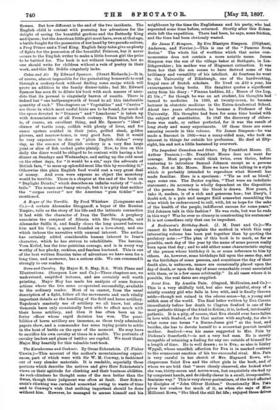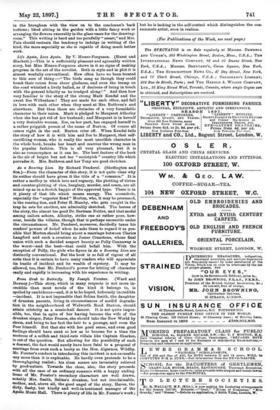Saint Eva. By Amelia Pain. (Osgood, Mcllvaine, and Co.)— This
is a very skilfully told, but also very painful, story of a saintly country girl who falls in love with, and is finally thrown aside—though not ruined in the odious sense—by, a young and selfish man of the world. The final letter written by Eva Corona immediately before her death to Clayton Seaford is one of the most pathetic things of the kind in fiction; it is, indeed, intolerably pathetic. It is a pity, of course, that Eva should ever have fallen in love with Seaford, or for that matter with anybody, for she is what some one terms " a Burne-Jones girl " at the best, and besides, she has to devote herself to a somewhat peevish invalid mother. Seaford—was his name suggested to Mrs. Pain by Dickens's Steerforth ?—is not a very bad man. He is merely incapable of retaining a feeling for any one outside of himself for a length of time. He is well drawn ; so is Eva ; so also is Maley Wygall, whose unselfish affection for Eva is in marked contrast to the evanescent emotion of his too successful rival. Mrs. Pain is very careful in her sketch of Mrs. Maynard Rowe, who chaperones Saint Eva and the other girls in the book, and of whom we are told that "more closely observed, she looked what she was, thirty-seven and nerve-worn, but exquisitely stacked up by competent hands, and decidedly clever in a small, irresponsible, feminine way." This is very clever portraiture, of the kind affected by disciples of "John Oliver Hobbes." Occasionally Mrs. Pain gives her readers too much of it, as when she says of Miss Millicent Rowe, " She liked the still fat life ; enjoyed those drives in the brougham with the view on to the coachman's back buttons ; liked sitting in the garden with a little fancy work or arranging the flowers execrably in the glass vases for the drawing- room." This writing is hard and too painfully" smart," and Mrs. Pain should restrain the tendency to indulge in writing of the kind, the more especially as she is capable of doing much better work.







































 Previous page
Previous page